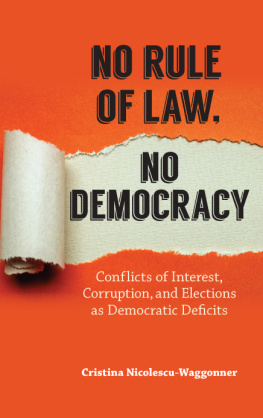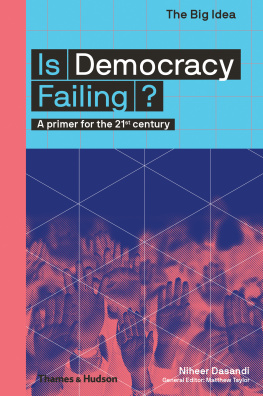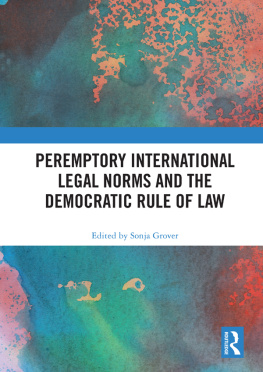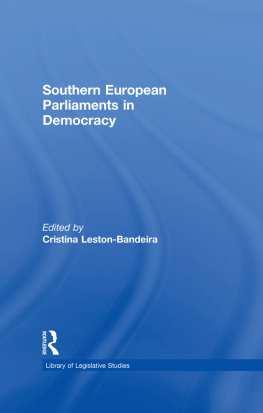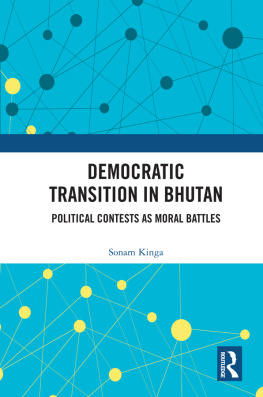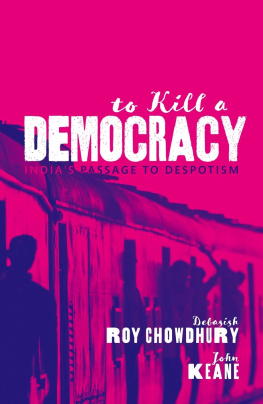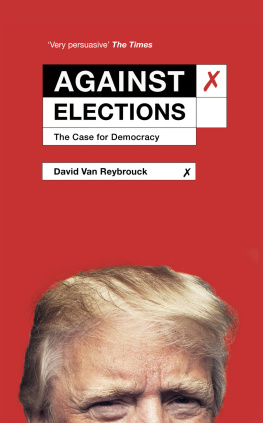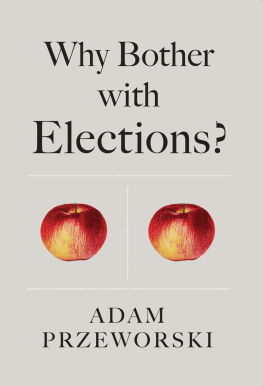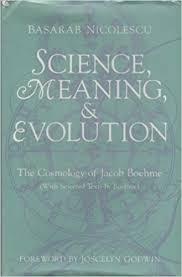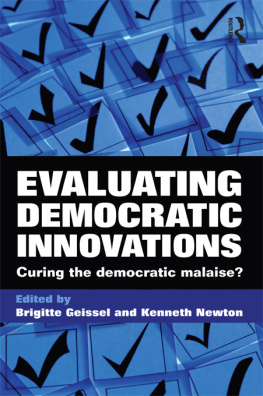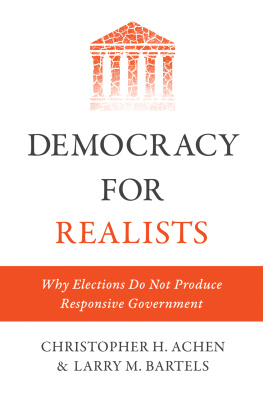NO RULE
OF LAW,
NO
DEMOCRACY
NO RULE
OF LAW,
NO
DEMOCRACY
Conflicts of Interest,
Corruption, and Elections
as Democratic Deficits
Cristina Nicolescu-Waggonner
Cover image from Fotolia
Published by State University of New York Press, Albany
2016 State University of New York
All rights reserved
Printed in the United States of America
No part of this book may be used or reproduced in any manner whatsoever without written permission. No part of this book may be stored in a retrieval system or transmitted in any form or by any means including electronic, electrostatic, magnetic tape, mechanical, photocopying, recording, or otherwise without the prior permission in writing of the publisher.
For information, contact State University of New York Press, Albany, NY
www.sunypress.edu
Production, Diane Ganeles
Marketing, Kate R. Seburyamo
Library of Congress Cataloging-in-Publication Data
Names: Nicolescu-Waggonner, Cristina, 1979 author.
Title: No rule of law, no democracy : conflicts of interest, corruption, and elections as democratic deficits / Cristina Nicolescu-Waggonner.
Description: Albany : State University of New York Press, [2016] | Includes bibliographical references and index.
Identifiers: LCCN 2016007292 (print) | LCCN 2016019076 (ebook) | ISBN 9781438462639 (hardcover : alk. paper) | ISBN 9781438462653 (e-book)
Subjects: LCSH: Political corruptionEurope, Eastern. | Political campaignsCorrupt practicesEurope, Eastern. | Conflict of interestsPolitical aspectsEurope, Eastern. | Rule of lawEurope, Eastern. | New democraciesEurope, Eastern.
Classification: LCC JN96.A56 C664 2016 (print) | LCC JN96.A56 (ebook) | DDC 364.1/3230947dc23
LC record available at https://lccn.loc.gov/2016007292
10 9 8 7 6 5 4 3 2 1
To Margareta, James, and Figaro
Contents
Part I
Democracy, Rule of Law, and Corruption
Part II
Democratic Rule of Law and Corruption in Practice
Part III
Democratic Rule of Law and Corruption: Cross-National Time-Series Analyses
Illustrations
Tables
Figures
Preface
This book comes from my attachment to democracy and its liberal values, but mostly from the desire to understand why certain former authoritarian countries are moving towards a Western type democratic regime, while others are not. I was raised during one of the most tyrannical communist regimes, Ceauescus Romania, as part of an oppressed dissident family. I grew up during the wobbly transition to capitalism and democracy and learned that unlike what communism taught us, people are not in fact equal in outcomes. I matured in Western Europe, where I learned the beauty of a generous welfare system, and I spent my adulthood in the United States digesting the novelty of having private health insurance, and what I thought, at least, was a very well-functioning bureaucracy and business sector.
So, I hoped to uncover the key to what I thought a successful political system was. How can a country reach democratic rule of law? How can Mexico, Russia, Thailand, Uganda, Romania, or Argentina earn the praise that, for instance, Poland, the Czech Republic, or Chile are receiving for successfully establishing democracy? True, advanced democracies are dysfunctional from many points of view, but citizens can predict with a margin of error what the outcomes will be when interacting with the state, the justice system, the bureaucracy, firms, and even with each other. In mature democracies, the contracts are enforced and civil liberties are protected, and thus, in comparison to the volatility, instability, and personal character of the new democracies, they seem like a desirable successful outcome. There are exceptions, but it can be argued that in the majority of cases this is true.
I went on a quest to find out why certain democracies become consolidated and others barely move ahead with reforms, and even revert back to authoritarianism. I argued that the main obstacle was political corruption. However, because corruption is an all-encompassing term (and, it seems, the default answer for all problems), I had to narrow my scope. I first chose Romania, a corrupt elites heaven, to understand the nature of the dysfunction, and to see if this is universal or culture bound. Academics and practitioners warned me to be cautious not to stir the waters and ask uncomfortable questions. No worries; everyone likes to talk about corruption, and after endless hours of smoke-heavy discussions (cigarettes are very popular), I found a pattern: politicians conflicts of interest, and their business contracts with the state, prevented them from reforming the justice system and enforcement mechanisms. Having uncovered the path, I carefully defended my case selection based on international reports and historical accounts. I dug deep into the Czech Republic to find out what it did well. I was eager to find examples of successful reforms that could be applied in all struggling democracies in the world.
While in Chicago for a political science conference, I expressed my enthusiasm to start fieldwork, when Jan Kov, a Czech academic, cynically laughed at my idea that the Czech Republic was a democratic success, and laughed even harder when I questioned his belief that his country was corrupt. After all, available reports at the time still considered it a consolidated democracy. When I think of a consolidated democracy I think of a highly predictable system that protects citizens civil liberties, responds to citizens demands, and has an available and efficient justice system. I was invited to Prague to experience firsthand this consolidation success. To my dismay I found a society submerged in corruption and conflicts of interest. Large state contracts were granted to personal companies owned by politicians, and party finances were illegally acquired from state procurement contracts. Worst of all, I found a highly manipulated justice system and an unpredictable application of laws. That was the so-called consolidated democracy, and it is still praised in many academic and practitioner circles, despite the fact that the parliament was dissolved following a corruption scandal that led Prime Minister Petr Neas to resign.
What I learned in this process is that democracy is far from consolidated everywhere in the world except in a handful of Western democracies, which developed it over centuries. For democracy to be fulfilled its legal system needs to be enforced. This topic is attracting more and more attention from the scholarly community and practitioners. Democratic rule of law is lacking in most new democracies of the third and fourth wave. This means that even if we observe free and mostly fair elections, there is not a clear and practical application of the separation of powers or independence of the judiciary, upon which peoples civil liberties depend. New democracies lack rule of law, because the actors in power are extremely corrupt and do not want to make these changes. Though academics and policymakers advise for the establishment of good institutions, I argue that this is impossible due to the causal mechanism uncovered here. I offer proof from over one hundred cases across two countries, along with carefully conducted statistical analyses, which test the validity of the findings in another one hundred states. I also venture to prescribe what I found to be perhaps one of the only feasible solutions to establish rule of law in endemic corrupt societies.

